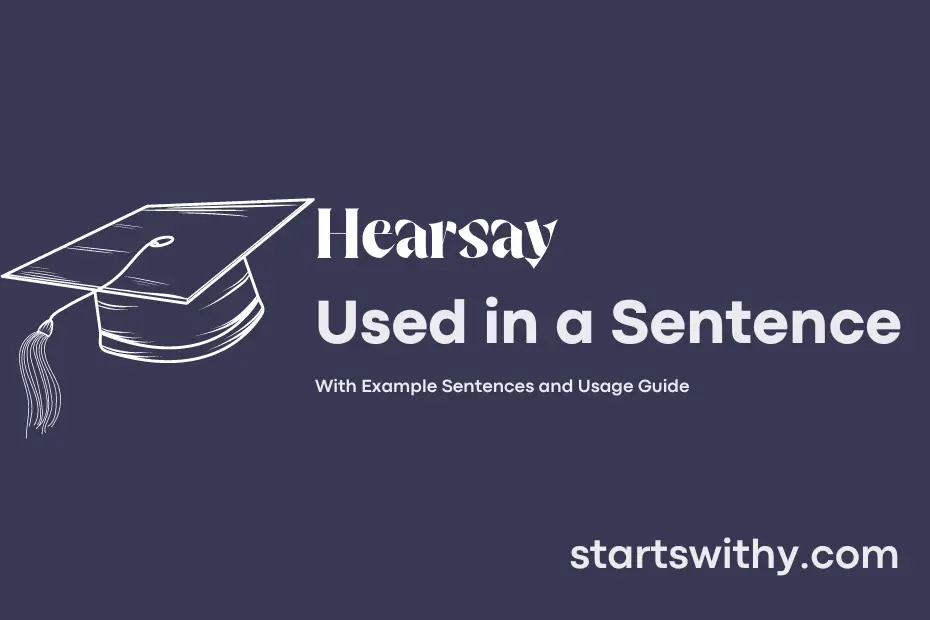“Have you ever heard a juicy piece of gossip and wondered whether it was true or just hearsay? Hearsay refers to information that is heard from someone else rather than being firsthand knowledge or evidence.”
Hearsay can be a tricky concept to navigate, especially in legal settings where its validity is often questioned. Understanding the implications of hearsay and its limitations can be crucial in determining the credibility and reliability of information presented.
7 Examples Of Hearsay Used In a Sentence For Kids
- Hearsay is when someone tells you something they heard from someone else.
- It’s not nice to spread hearsay about your friends.
- Hearsay can sometimes be like a game of telephone, where the message gets changed as it is passed along.
- It’s important to always check if something is true before believing hearsay.
- If you have a question about something you heard, it’s okay to ask for more information instead of just believing hearsay.
- Remember to always be kind and not say unkind hearsay about others.
- Teachers can help you understand what hearsay means and why it’s important to be honest.
14 Sentences with Hearsay Examples
- Hearsay has it that the upcoming college fest will have a renowned DJ performing live.
- I heard some hearsay about a surprise quiz coming up in our next lecture.
- The rumor mill is buzzing with hearsay about the new faculty member joining our department.
- Hearsay suggests that the canteen will introduce a new menu starting next week.
- Have you heard the latest hearsay about the campus elections? It’s going to be a tough competition.
- Students are abuzz with hearsay about the possibility of classes being canceled due to the upcoming strike.
- The hearsay going around about the upcoming internship opportunities at top companies is getting everyone excited.
- Hearsay has it that the college is planning a trip to an exotic location for the annual cultural festival.
- I heard some interesting hearsay about a guest lecture being organized by the Science department next month.
- The senior students were discussing some hearsay about job placements and internships during a study session.
- The hostel residents were exchanging hearsay about the new facilities being added to the common area.
- The hearsay about the new entrance exam pattern was causing quite a stir among the students.
- I overheard some hearsay about a group project being assigned in our next communication skills class.
- The hearsay circulating about a talent show being organized by the college cultural committee has everyone excited.
How To Use Hearsay in Sentences?
Hearsay is a term used in law to describe an out-of-court statement offered in court to prove the truth of the matter asserted. In simpler terms, it means using information or statements heard from someone else as evidence.
To use hearsay in a sentence, you can follow this structure: “The witness testified that the defendant was at the park based on what their friend told them, but the judge ruled it as hearsay and inadmissible in court.”
When incorporating hearsay into your writing or dialogue, remember to always attribute the information to its original source. For example, “According to Jane, who heard it from Mary, the store will be closing early today. However, this information is considered hearsay and should be verified before making any decisions based on it.”
Using hearsay in a sentence can strengthen your argument or storytelling by adding layers of information or perspective. Just be cautious of its limitations in legal settings, where hearsay may not be admissible as evidence due to reliability concerns.
Practice makes perfect, so try incorporating hearsay into your writing or conversations to familiarize yourself with its usage and implications.
Conclusion
In conclusion, hearsay is information that is passed on from one person to another without direct knowledge or confirmation of its accuracy. It is often considered less reliable than firsthand knowledge or direct evidence. In legal settings, hearsay may be inadmissible as evidence due to its potential unreliability.
It is important to be cautious when relying on hearsay in making decisions or forming opinions, as it can easily lead to misunderstandings or misinformation. Seeking corroboration or firsthand evidence whenever possible is essential to ensure accuracy and credibility in our understanding of events or situations.



